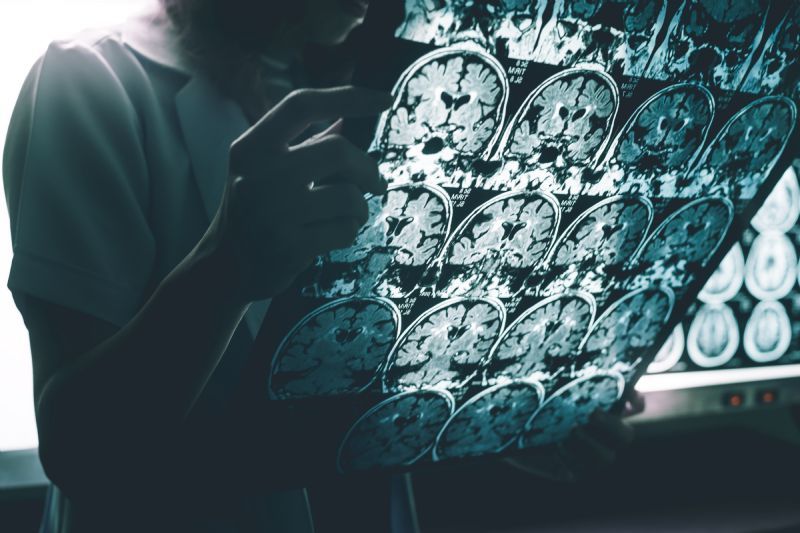 Written by Mike Price, OT
Written by Mike Price, OT
November was designated as National Alzheimer’s Disease Awareness Month by President Ronald Reagan in 1983, a man who later developed this disease himself in 1994 and lived with it for ten years, until his death in 2004. While less than 2 million Americans had Alzheimer’s back in the early 1980s, those numbers have grown to nearly 5.7 million today, affecting about 1 out of every 2 families in the United States.
As the most common form of dementia, Alzheimer’s disease adversely affects memory and other cognitive abilities, causing a decline in these faculties that can be slow, fast, or seem to happen in bursts. Making up between 60% to 80% of all dementia diagnoses, the majority of people affected by this disease are 65 or older. It is important to understand that Alzheimer’s is not only a disease of old age, nor is it a normal part of aging. Around 200,000 Americans under the age of 65 are living with early-onset Alzheimer’s disease, as well.
As a progressive disease whose symptoms worsen over a number of years, its beginning stages can present symptoms that are more manageable, while its later stages require more constant caregiving and assistance. Survival rates vary greatly, ranging from 4 to 20 years from the time of diagnosis, and are dependent upon other existing health factors and the age of the affected individual.

With statistics that list it as the 6th leading cause of death in the US, the 5th leading cause of death for Americans 65 and older, and the only top 10 cause of death that can’t yet be prevented, cured, or even slowed, it is no wonder that anyone being diagnosed with Alzheimer’s can quickly become terrified and discouraged contemplating the journey that lies ahead. But the good news is that there are more scientists and researchers working on this disease than ever before in a worldwide effort to find more efficacious ways to prevent Alzheimer’s disease, delay its onset, and treat it effectively.
It is exactly because of its prevalence that we have also learned what works and what doesn’t when it comes to treating the multiple symptoms Alzheimer’s can cause. Thankfully this long history of trial and error has created an important database of information that you can arm yourself with if you or a loved one is living with this disease. Because so many individuals and families have been directly impacted by Alzheimer’s and other dementias, there is an ever-increasing flow and supply of valuable knowledge these family caregivers impart that will greatly help others in their own daily experiences living with this disease.
If you or a loved one has been diagnosed with Alzheimer’s or another dementia, one of the best first things to do is check out the abundance of information available from the Alzheimer’s Association. This amazing organization has also been around since 1980, and offers a multitude of resources, support, education, and research to better equip you for your disease journey, know what to expect, and enable you to formulate a plan for every stage. It is also important to talk with your doctor about any concerns you have along every step of the way, and ask about any available support, locally or online, with which you can connect.
While early stages of Alzheimer’s tend to cause some mild problems with memory, cognition, and behavior, these symptoms will tend to get worse in later stages of the disease progression. If you are the one with the disease, it is crucial to form a support team with family members, friends, your doctor, and other medical professionals as soon as possible. You should agree on a course of action for now, and for when the disease gets worse. Support systems like Hospice programs can get involved much sooner in the Alzheimer’s disease process than most people think, and should be looked at for possible assistance, especially if the patient with Alzheimer’s is being cared for at home.
Other support includes the National Council on Aging, who offer educational and supportive resources on their website, in addition to local offices where you can meet with someone to talk about all the possible assistance available to you in your community. Local community health centers often offer dementia and Alzheimer’s disease resources, as do some community senior centers. Planning for the need for some form of outside help, whether in-home or in a long-term care facility, is necessary, and will be required at some point along the way, even with family caregiving help. Again, the Alzheimer’s Association can help with this, and with every other aspect of how this disease changes your life, and the lives of those who love you and care for you.

No matter where you are in your Alzheimer’s journey, there are always ways to help you manage the symptoms and find better ways to cope with the loss of cognition and memory. It’s important to stay as active as you can, both physically and mentally, engaging in games and exercises that enhance circulation and encourage you to think and remember. As the disease progresses, these activities may become more annoying than enjoyable, however, so don’t force them at those stages.
People with Alzheimer’s disease and other dementias are just like anyone else--they want to feel appreciated, they want to feel useful, and they differ in their abilities just like the rest of us. They’ll be able to do more of the work and play they’ve been doing, live the life they’re used to early in the disease process, while later stages will take these abilities away. Some may want to engage in simple chores such as folding clean laundry, washing a few dishes by hand, or sewing a button, but there may come a time they cannot perform these tasks. Activity aprons and fidget activities can help fulfill that common dementia need to move, to do something with their hands, helping to mitigate anxiety and agitation.
Music is one of the most enjoyable activities for people with Alzheimer’s and dementias to participate with, and music therapy should be used consistently throughout the disease journey. Using more light during the daytime hours, especially natural daylight, is also beneficial for most people with this disease, while turning lights lower as the evening progresses can soothe agitation and encourage better sleep. People with Alzheimer’s, especially those who also experience Sundowning Syndrome and/or SAD (Seasonal Affective Disorder) should also try light therapy, using specially designed bright lights to mimic sunlight, which has been shown to minimize depression, sundowning, anxiety, insomnia, and SAD.
Because using a phone eventually becomes problematic, it’s important to have a medical alert system in place, or a two-way communication device for the Alzheimer’s patient to wear. This is especially helpful for live-in caregivers to keep in direct contact with the patient when they’re not always in the same room, and also gives the patient a way to call for medical help (911) or other programmed caregiver numbers. Chair, door, and bed alert devices also provide helpful caregiving support for wandering patients (an activity that many Alzheimer’s patients start to do), with an alarm that goes off when they get up from a chair or bed, or go through a door.
For those still in the earlier to mid-stages of Alzheimer’s, talking products can be of great benefit. Talking clocks, watches, appliances, and temperature control devices can help those with dementia to stay on track and remember what they’re doing, especially for reminders about medicine and doctor appointments. Adaptive eating utensils and dishes can also be of great help for people with Alzheimer’s, as our sight and manipulative abilities change with this disease, making it harder to eat independently.
High-quality bedding is a wonderful investment to ensure the best night’s sleep possible, which will make everything better for the Alzheimer’s patient (and the people caring for them). Adjustable hospital-type beds can make a big difference in the level of care provided in-home, as can distinctively-designed mattresses made specifically for Alzheimer’s and dementia patients. Other therapeutic furniture that can help allay the negative symptoms include vibroacoustic chairs to provide sound and vibration for deeper relaxation, calming agitated behaviors and feelings.

Co-Founder of Rehabmart and an Occupational Therapist since 1993. Mike has spent his professional career working in multiple areas of Occupational Therapy, including pediatrics, geriatrics, hand therapy, ergonomics and inpatient / outpatient rehabilitation. Mike enjoys writing articles that help people solve complex therapeutic problems and make better product choices.